Coronavirus: Is my lockdown drinking normal?
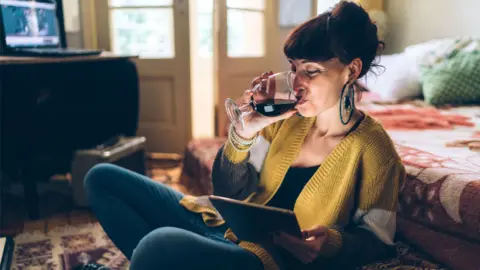 Getty Images
Getty ImagesPubs and bars may be closed across the UK, but supermarket alcohol sales are on the rise, off-licences have been classified as essential businesses and recycling bins have been seen overflowing with wine and beer bottles.
New research from Alcohol Change UK suggests that one in five people (21%) say they are drinking more during the pandemic. However one in three (35%) say they are drinking less, or claim to have totally stopped drinking.
Clare Pooley, author of The Authenticity Project and the Sober Diaries, said there were "so many reasons" why someone might find themselves drinking more right now.
"Alcohol and anxiety are so clearly linked," she says. "We train ourselves over decades to associate any form of stress with a need to drink.
"At a time like this, your natural inclination is to pour yourself a drink. If you were the type to come home from the office, open the fridge and get a drink - well, you're probably not going to the office now, so it's tempting to have one earlier.
"You might think 'I wouldn't normally have a drink now… but heck, I'm in the middle of a global pandemic'."
But Clare, who stopped drinking five years ago, suggests the pandemic is also a great reason to give up booze.
It's important to remain "level-headed" at a time like this - especially those looking after children or aged parents, she says.
"Alcohol does compromise your immune system as well and it's a good idea to remain in peak mental and physical condition right now," she added.
She said she was also concerned some people may pick up a drinking pattern during the pandemic that is then difficult to stop.
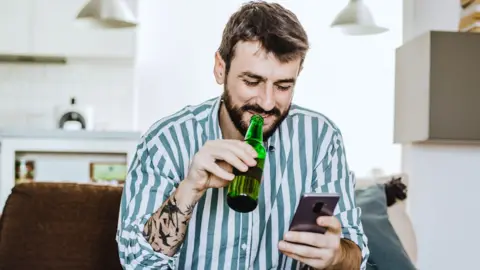 Getty Images
Getty ImagesThe World Health Organization has also warned that access to alcohol should be restricted during lockdown.
Claire Rostron, senior health sciences lecturer at the Open University, said: "The way our brains work is that alcohol is something that's rewarding - and what our brains do is weigh up the effort and reward of pursuing it.
"Lockdown has made the pursuit of it more risky - you have to go out for it. For people who drink occasionally, the reward system is not so prominent, which means they might make the decision not to go."
However, she said people are under stress right now and drinking releases dopamine, the body's feel-good chemical - so some are drinking either the same, or more. As it's also a sedative, people might be finding it helps them sleep.
"It's some people's coping mechanism," Claire said. "I'm certainly still having a glass of wine or beer. It's a time of adaptation right now."
She adds that it could be the case that there is a dip in some people's drinking before a new way of socialising - such as having happy hours on video chats with friends - beds in a bit more.
She also suggested it could also be the case people are trying to take the opportunity to come out of lockdown fitter - aware it could be too easy to come out of it more unhealthy and drinking too much.
'Start of the evening'
Author Mhairi McFarlane is one of those who've committed to a "Dry Covid" - the term being adopted for staying off alcohol throughout the rest of the lockdown.
She said that, in the first weekend of lockdown, she took advantage of the fact she wasn't expected to go out to see anyone the next day so drank enough to get a hangover.
Then she found she was "pouring a drink by 5.30pm every day and announcing the evening had started, as an attempt to put some structure back in to my day".
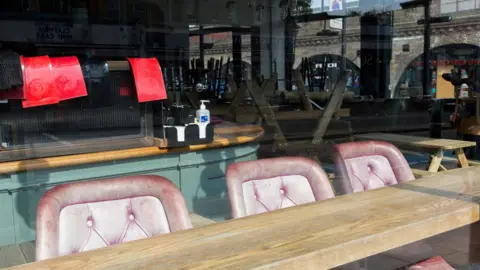 Getty Images
Getty Images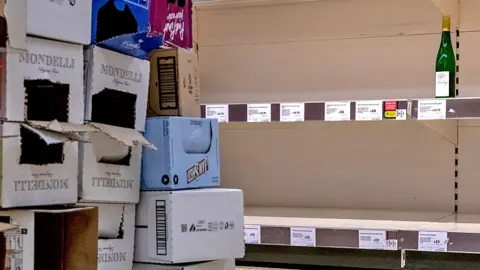 Getty Images
Getty ImagesBut Nottingham-based Mhairi said she was soon getting regular headaches and realised "performatively boozing" her way through lockdown wasn't going to work for her.
After a few days off alcohol to recover, she found she wanted to carry on without it - and is now on day 22 of a month off.
"I file the first draft of my seventh novel at the end of the month and am planning on having some champagne to celebrate, but otherwise, think I'm going to return to Dry Covid," she says.
"I completely understand people who've gone the other way and are Instagramming working day lunchtime G&Ts or a beer in their sunny garden. Sometimes it takes willpower not to join in, but I'm enjoying the control it's given me back in quite a powerless situation otherwise.
"Not to mention the lack of hangovers," she adds.
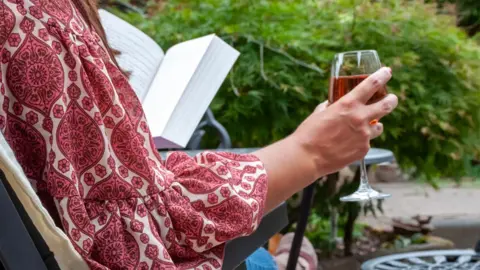 Getty Images
Getty ImagesAuthor and blogger Clare Pooley says for those wanting to stop or cut down, there are a plethora of groups to help - including Club Soda and Soberistas, as well as a wealth of books and Facebook groups online. For those who need more support, Alcoholics Anonymous is offering help, including online meetings, she said.
- If you need help with alcohol issues, a list of organisations can be found here.
But she adds some might find it easier to stop drinking now - as usually when you go out you "have to justify why you're not having a drink".
"But right now, everybody is in the same boat so you don't feel like a social leper," she says.
The research commissioned by charity Alcohol Change UK - which saw surveyed 2,000 people for the research - also suggested:
- 14% said they were taking drink-free days
- 6% of those who previously drank said they were not having any alcohol at all
- 47% of those who drank once a week or less have cut down or stopped
- Meanwhile, 27% of those who drank between two and six times a week, and 17% of daily drinkers, have cut down or stopped while the lockdown is on
- 18% of daily drinkers have increased the amount of alcohol they're drinking
Alcohol sales in supermarkets and corner shops leapt by 22% in March, according to consumer analysts Kantar - with sales of wine, beer and spirits topping £1.1bn in the four weeks to 22 March.
In all, it was an extra £199m compared to the same period in 2019.
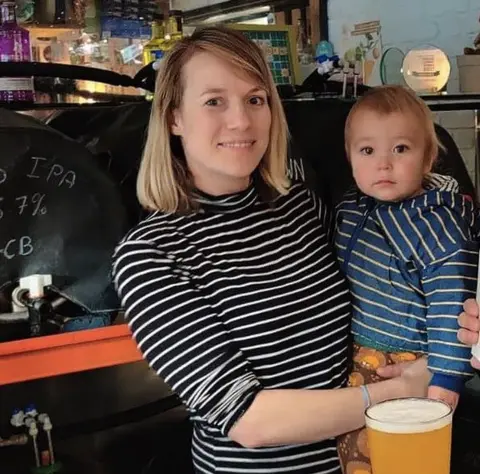 Garden City Brewery
Garden City BreweryBut what about those who make their living in the alcohol industry?
Holly-Anne Rolfe runs the Garden City Brewery bar and microbrewery in Letchworth, Hertfordshire, with husband Nick - and says they've been kept as busy as ever, by adapting to provide a takeaway and delivery service.
But she said it appeared they had a new set of regulars - with business as busy as usual, albeit in a different way.
"It's definitely a community support thing," she said, with locals wanting to help businesses. "But people are also trying to have a nice experience in their own homes."
They are only opening a few days a week for limited hours - but brewing the same amount as normal.
"A lot of the older regulars haven't ordered, but it's just not something they would do," she said. "Because they usually come to us for the social experience."
Those coming down to collect a takeaway from the bar - socially distanced, with a one-in-one-out system - are seeing it as a "bit of normality", she added.
"It's nice for them to come down and see people they know and to get out of the house," said Holly-Anne.
"It's about keeping routines going."
